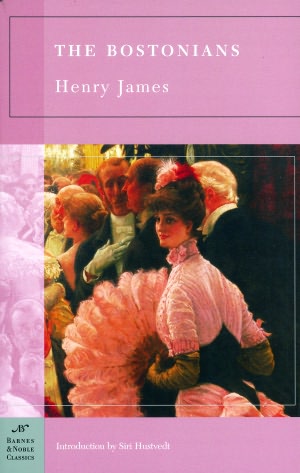- ISBN-13: 9781593082970
- Publisher: Barnes & Noble
- Publication date: 5/1/2005
- Pages: 480
I've only ever read one other thing by Henry James, Dubliners, and he's just apparently not a very happy guy. This story was no different. I wasn't anticipating a whole lot of happy, happy, joy, joy, but I was not expecting the level of pissed off I was going to experience by the end of the book.
The story centered on the feminist Olive Chancellor, who was a satire in and of herself. I'm not sure where James stood on the issue of women's rights, but by what I read I could see him going either way. The character was a passionate, highly intelligent woman, but her downfall was the fact that she spent too much time thinking about the wrongs done to women and fighting the good fight that she often was made to look a fool. Her caricature was almost mocking the women's movement. Then there was Verena who was flighty but good-hearted and was led around by the nose by Olive. She gave herself fully when it was asked of her, but she turned out to be completely useless and not really dedicated, although you couldn't really blame her since she was just sucked into Olive's orbit. Finally, there was Olive's cousin, Basil Ransom. A Mississippian in the years immediately following the Civil War, he's poor and of course, has the gentleman complex. Which is code for saying he acts like an ass for the entire book. He basically decides he's going to seduce Verena away from her activities as a feminist activist because he believes all women are basically useless except in their capacity for loving. Gross. And he somehow convinces Verena and destroys Olive in the process.
Henry James is always really good at creating ambiguous characters. You hate them for a lot of reasons, but you can also see the reasoning behind a lot of their actions, so you can't entirely justify how much you want to punch them in the face. Verena is so sweet, and you know at the beginning that she doesn't really give a flying rat's ass about the movement and only proclaims she does because Olive makes her believe she does. Basil comes along and we see how irresolute and flaky she is. You want to be sympathetic to Olive, but she's just so damn dramatic about everything you can't stand her. Basil...there were times when I didn't think he was too bad, merely jaded with the world, and especially when he was essentially hunted down by Adeline, but he just trampled all over Olive's and Verena's lives because he could. He was disrespectful and willfully harmful. Plus, everyone knows he's going to treat Verena like crap, even though he's convinced her that her voice and talents are only for him, that she's not meant for public speaking because he doesn't want her "sullied" by it, and that she's going to be happy being dirt poor and basically sitting at home waiting for him.
As you can see, there wasn't a single character that I liked unreservedly. James isn't a bad writer, he just loves making your emotions fluctuate. I would say this was a great book if I could extract my extreme irritation from the moment Basil hunted Verena down in Cambridge until the end of the book from the equation, but I can't. This book made me actually want to reach in and slap the characters around.
Which is what it was supposed to do. So for quality of writing:
Overall: B-
James can at times be wordy and repetitious, but he's fabulous at characterization, no matter how those characterizations make you feel. The story moves along fairly easily despite his long paragraphs and the development makes sense. I just can't get over the distaste the whole subject left in my mouth which is why my score is lower than it probably should be.

No comments:
Post a Comment